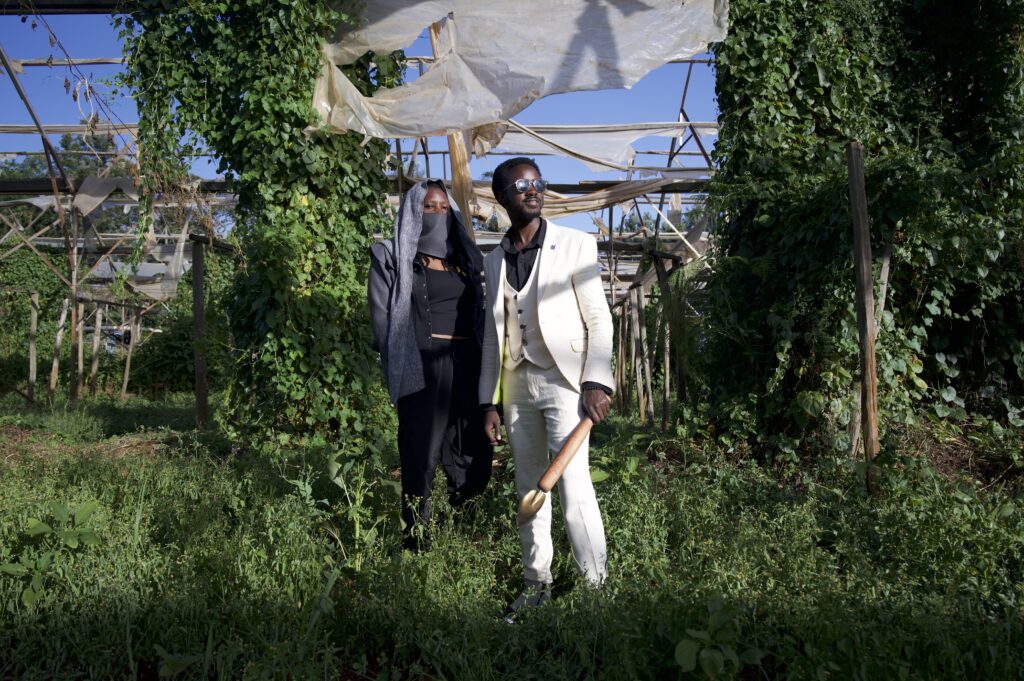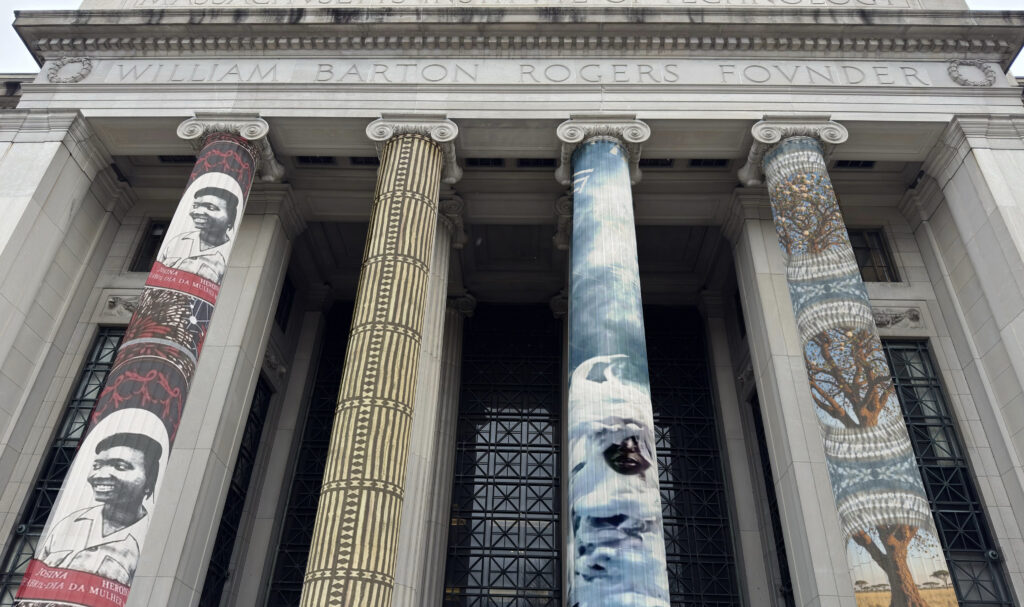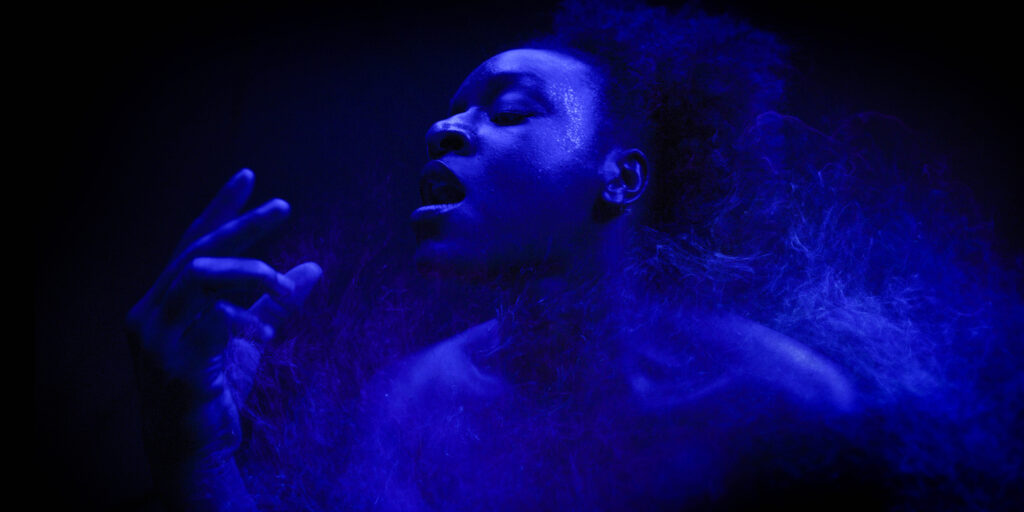- Press release as PDF
- STARTS Prize Africa & Jury 2025
- Winners 2025 inkl. Jury Statement
- Interview with Kairos Futura via Ars Electronica Blog
- Photos via Flickr
(Linz/Brussels, June 11, 2025) In its second year, the European Union’s STARTS Prize Africa received 537 submissions from 33 countries. The winners of the international competition, which was once again organized and run by Ars Electronica, have now been announced.
The Grand Prize, worth €15,000, goes to Kairos Futura (KE) and The Wild Future Lab. The project explores an alternative vision of the future, transporting Nairobi to the year 2045—a time when nature will have reclaimed large parts of the city’s infrastructure. The Wild Future Lab explores textiles, machines, and garments, examining how new approaches to production and design can address ecological and cultural challenges. It brings together artists, designers, technologists, and scientists to collaboratively shape a sustainable, creative, and self-determined Kenyan future—using the resources available today.
Additionally, five Awards of Distinction are presented, each with €3,000 in prize money. They go to Fisherchild by Traci Kwaai (ZA), Lo-Def Film Factory (ZA), and Kyle Marais (ZA), Sands Of Time: Walls We Can Walk Through by Ala Praxis (NG), The Founders Pillars by Meghna Singh (IN), Simon Wood (IE), and Lesiba Mabitsela (ZA), Black Planetarium – Uncharted: Anthologies Across the Atlantic by Kidus Hailesilassie (ET), and Written To Not Remain by Tewa Barnosa (LY).
In 2025, the winners were selected by a jury made up of Andrea Barschdorf-Hager (AT), Mónica Bello (ES), Joy Mawela (ZA), Kathleen Siminyu (KE), and Tau Tavengwa (ZW/GB).
Exhibition at the Ars Electronica Festival 2025
A selection of the award-winning projects of the STARTS Prize Africa will be on display at the Ars Electronica Festival 2025 from September 3 to 7 at POSTCITY in Linz. The official award ceremony of the STARTS Prize Africa will be part of the Prix Ars Electronica Award Ceremony and take place on Thursday, September 4, 2025, at the Design Center Linz.
About S+T+ARTS Prize Africa
With the STARTS Prize Africa, the European Union builds on the success of the renowned STARTS Prize, which has supported European innovation policy at the intersection of science, technology, and art since 2016. The STARTS Prize Africa is specifically aimed at artists and organizations that originate from, live in, or work in an African country. It honors interdisciplinary projects that address pressing challenges on the continent and offer new impulses for social, economic, or political change.
International Network
As a key initiative of the European Commission, the STARTS Prize Africa reflects a broader commitment to deepening EU-African cooperation by spotlighting Africa’s dynamic creative ecosystems. The competition is supported by a network of international partner institutions. It is led by Ars Electronica (AT). GLUON (BE), CHRONIQUES (FR), as well as the Royal Museum for Central Africa (BE) serve as additional key partners.
Since 2024, the EU has placed greater emphasis on arts-driven innovation in key world regions, recognizing its transformative potential in addressing global challenges. This strategic focus is exemplified not only by the second edition of the STARTS Prize Africa but also by the launch of the first edition of the STARTS Prize South America in 2025.
S+T+ARTS Afropean Intelligence is funded by the European Union under the STARTS – Science, Technology and Arts initiative of DG CNECT under grant agreement LC-03568051. Views and opinions expressed are those of the author(s) only and do not necessarily reflect those of the European Union or DG CNECT. Neither the European Union nor the granting authority can be held responsible for them.
S+T+ARTS PRIZE AFRICA ’25
Grand Prize
Awarded for artistic exploration and art works where appropriation by the arts has a strong potential to influence or alter the use, deployment, or perception of technology.
The Wild Future Lab
Kairos Futura (KE)
“Kairos Futura, through The Wild Future Lab, and in the rest of their work, boldly proposes what a re-imagining process might look like in ways that challenge the familiar, are fun, and transcend genre, form, discipline, and appeal. By directly challenging how we imagine the future from a Kenyan/Nairobi perspective, Kairos Futura is daring Africans to wildly engage one aspect of life on the continent—developing a new, homegrown imaginary of both the present and the future—that is in desperate need of attention, and new approaches. Many such attempts exist, but most are exercises in mere, often shallow image-making without substance. […] Kairos Futura’s Wild Future Lab attempts to build the beginnings of that roadmap in modest but inspiring ways through continuing experiments that involve dreaming, developing, and testing, and prototyping new ideas and objects.”
Excerpt from the jury statement
Since 2021, the Kenyan collective Kairos Futura has been exploring speculative futures and ecological resilience, with a focus on addressing social and environmental challenges in East Africa. Its most recent project, The Wild Future Lab, imagines Nairobi in 2045, when abandoned greenhouses and forgotten infrastructure will have been reclaimed by native flora and fauna. The question is: How can fashion respond to—and help facilitate—a transition toward rewilded urban spaces?
Though driven by storytelling, Kairos Futura produces tangible outcomes rather than mere future fantasies. The Wild Future Lab merges traditional Kenyan craft techniques and innovative textile production methods. By building electronic spinning machines from 3D-printed components and open-source CNC files, processing locally grown fibers, and experimenting with upcycling practices, the project turns fashion design into a form of critical future-making—actively imagining and materializing regenerative possibilities. Simultaneously to its research and experiments, The Wild Future Lab developed a participatory design methodology that includes speculative world-building techniques, shaped through a series of workshops.
The project asks how African cities could become more resilient in the face of climate uncertainty and what kinds of relationships might emerge between people and plants, animals, and ecosystems in spaces reclaimed by nature.
Kairos Futura is awarded the Grand Prize for its visionary work in developing a future-oriented and locally rooted understanding of both present and future realities in Kenya.
Credits
Lead creative team: Kairos Futura
Kairos Futura: Abdul Rop, artist; Lincoln Mwangi,
artist; Willie Nganga, scientist; Stoneface Bombaa, artist; Ajax Axe, artist; Coltrane McDowell, designer
Workshop facilitation: Kairos Futura Team and New Order of Fashion
Photography: Ajax Axe and Adams Rop
With support from Stimuleringsfonds and Netherlands programs by New Order of Fashion
S+T+ARTS PRIZE AFRICA ’25
5 Awards of Distinction
Fisherchild
Traci Kwaai (ZA), Lo-Def Film Factory (Francois Knoetze & Amy Louise Wilson) (ZA), Kyle Marais (ZA)
Fisherchild is a community-based project centered on the centuries-old fishing community of Kalk Bay in South Africa. It translates their oral storytelling archive into an interactive digital archive of indigenous marine knowledge and explores how traditional practices can be preserved through storytelling technologies such as 360° video, photogrammetry, and VR. Sixth-generation fisher child Traci Kwaai archives and retells the stories of her community, whose livelihood is threatened by a lack of access to marine resources. Fisherchild preserves the cultural heritage and identity of this community through a virtual experience featuring 3D documentation of key artefacts, sites, and oral histories, as well as a site-specific audio tour. Youth from Kalk Bay contributed directly to the VR experience, working collaboratively with artists and technologists.
Beyond the digital work, the project piloted a community kitchen that sells locally made goods via an app, serving as a model for community-led income.
Credits
Youth participants: Amy Jacobs, Aliyah Pettersen, Lila Wackernagel, Jorja Williams
With oral history contributions by: Gigi Fisher, Haya Fisher, Marie Boltman, Faez Poggenpoel
Sound: Hilton Schilder
Additional imagery: Justin Blake
With support from: the Heritage Management
Organization and the Mellon Foundation
Sands Of Time: Walls We Can Walk Through
Ala Praxis (NG)
Sands of Time: Walls We Can Walk Through is an architectural, multi-sensory installation that explores the fragile balance between urban expansion and environmental degradation in Dar es Salaam. It tells a story about the dual nature of sand—a vanishing resource driving the city’s rapid growth, and a force of destruction when extracted irresponsibly. This extraction is followed by severe consequences: eroded coastlines, destroyed habitats, and displaced communities.
Through interactive projections, sound, photography, text, found-object art, animation, and experimental construction techniques, the project highlights the tension between Dar es Salaam’s vibrant coastal life and the growing threat of environmental collapse.
Sands of Time frames sand mining within a wider, deeply human crisis. Iturges us to face the far-reaching consequences of fast-growing cities—and to ask whether the future will be defined by a landscape of ruin, or by alternatives where development, participation, and sustainability coexist.
Credits
Residency hosts: INOVA+, Nafasi Art Space
Ala Praxis: Philip Fagbeyiro, Peace Olatunji, Timilehin Osanyintolu, Jadesola Olaniyan, Noah Okwudini, Josh Egesi
Installation and construction: Mufaddal Nagree, Abubakari Ibondo, Salamu Abdala, Haji China, Siyani Mponda, Imanueli Sanga, Omari Hamis, Acley
Mwalusamba
Technical support: Bukunmi Oyedapo
Sound, audio & translation: John Kitime, Salma Mun-de, Rhoda Kambenga
Curatorial research and support: Jesse Mpango,
Mariam Gichan Athman, George Freemason Msuya
Animation: Gwamaka Mwabuka, Dianne-Maryline Charles, Shalom Micky, Ally Mtandilla, Efraim Lyimo, Tai Animations Studio
The Founders Pillars
Meghna Singh (IN), Simon Wood (IE), Lesiba Mabitsela (ZA)
The Founder’s Pillars is a site-responsive Augmented Reality (AR) memorial and multimedia installation that engages with decolonial practices by fusing colonial architecture with African futurist storytelling.
Its current iterations transform the New York Stock Exchange and MIT’s Rogers Building into dynamic monuments honoring the African diaspora—achieved by digitally wrapping their columns in animated textiles. The project draws from six regions of the African continent, each represented by a distinct textile and an associated myth or story, brought to life by AI-generated films and AR. An accompanying installation at Water Street Projects features a power loom that digitally weaves African fabrics, revealing the ancestral knowledge embedded in their designs.
A travelling memorial, The Founder’s Pillars uses sound, animation, and textile visualization to embed ancestral memory and cosmology into digital cloth. It reclaims symbols of colonial and institutional power in public spaces, transforming them into sites of remembrance and resistance.
Credits
Co-creators: Dr Meghna Singh, MIT Open Documen-tary Lab & School of Communications and Culture, Aarhus University Denmark; Simon Wood, MIT Open Documentary Lab; Lesiba Mabitsela, AFRI Africa Fashion Research Institute
Editor and After Effects: Michael Carter
Augmented Reality: Nicolas Robbe @ Hoverlay
Incubated at the MIT Open Documentary Lab
Black Planetarium – Uncharted: Anthologies Across the Atlantic
Kidus Hailesilassie (ET)
Black Planetarium – Uncharted: Anthologies Across the Atlantic is a cosmic performance installation inspired by 5,000 years of knowledge generation from the African continent. It is designed as a collaborative experience that brings together ancestral knowledge, speculative storytelling, cartography, and live performance.
Uncharted: Anthologies Across the Atlantic is shaped by Kidus Hailesilassie’s earlier large-scale cartographic installation, Ancestral Algorithm (2019–2023), which collected, digitized, and mapped over 6,500 pictographs, ideographs, syllabaries, alphabets, and iconographs from twenty African languages. Using a combination of custom workflows, pirated AI tools, machine vision, and crowd-sourced spatial-sonic computation, it weaves emerging technologies with some of the oldest knowledge systems rooted in African traditions, thus creating a cosmic performance inspired by “Adowa”—a dance practiced by the Ashanti community in Ghana.
Uncharted: Anthologies Across the Atlantic revisits the legacy of African resistance, strengthens decolonial knowledge generation, and uses Afro-Surrealism to imagine new collective futures.
Credits
Motif Art Studio
Algaada Centre for Small Scale Farming and Agricultural Research
The film DESERT PHOSfate is part of the PHOSfate Artistic Research Project together with Pekka Niskanen, funded by Kone Foundation, Osker Öflunds Stiftelse, and Arts Promotion Centre Finland.
Written To Not Remain
Tewa Barnosa (LY)
Written To Not Remain is an ongoing visual investigation into the act of writing on walls across post-revolution Libya. The project employs collective statements as evidence of contemporary and historical events, as well as forms of social commentary, correspondence, and often silent protest. It invites reflection on the state of the world through the Western-led, manufactured wars in Libya.
The result is a video work combining archival imagery with scenes acted out inside a VR simulation. Tewa Barnosa recontextualizes a photo archive of over 200 images of writings she began collecting in 2019, elaborating on the happenings they point to. Many of the writings refuse to normalize everyday violence and death. Some are dark, dystopian, or alarming realities referring to previous frontlines and battlefields, others carry the surreal irony of the times.
Written To Not Remain questions the world-building role of social gestures such as political graffiti writing and speculates on their futures in a digitalized reality increasingly led by a technologically militarized economy.
Credits
Edited by Moon studio
With support from: Amsterdam Kunst Fonds


